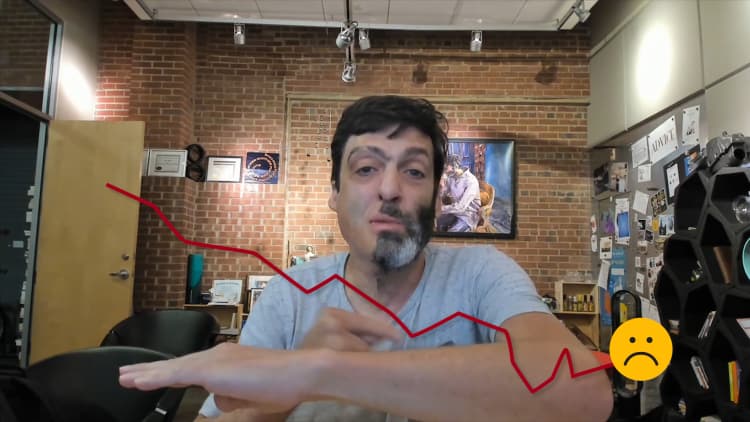
Recent wild market swings have led some 401(k) investors to clamber into safer assets.
However, you may want to press pause before you increase your exposure to bonds or cash-type funds.
Net trading activity in 401(k) saving plans was higher in the last week of February than all of the combined activity in the fourth quarter of 2019, according to the Alight Solutions 401(k) Index, which measures daily activity of more than 2 million 401(k) investors with about $200 billion in assets.
The assets most sought by investors included bond funds, with 47% of inflows; stable value funds, 41%; and money market funds, 11%; according to Alight.
Meanwhile, investors fled from large U.S. equity funds, which had 43% of outflows; target date funds, 27%; and mid U.S. equity funds, 10%.
Those moves are in contrast to what most financial experts are telling investors — to sit tight and stay focused on their long-term goals.
"The balance is going to go up and down," said Kelly O'Donnell, executive vice president at Edelman Financial Engines. "That's just part of the market."
What investors need to do is make sure their actual allocations match their long-term goals, she said.
"A long-term diversified portfolio has proven to be a great form of retirement savings for most Americans," O'Donnell said.
How to sort through your 401(k) options
Still, it's tempting to want to move to assets that are not generally correlated to stocks when the market falls.
That's when investors reach for bond, stable value or money market funds.
Bond funds invest in debt securities, in contrast to stocks, which let investors take a stake in public companies. Bond investments are generally considered less volatile, and therefore safer.
The downside: returns are less. For example, the S&P 500's return was more than 13% since 2010, while the Bloomberg Barclays U.S. Aggregate Bond Index came in with 3.5% over that period, according to Morningstar.
Certain allocations — such as 60% stocks and 40% bonds, or 70% stocks and 30% bonds, for example — are often used to hedge risk. Experts generally recommend that you base your overall mix on a number of criteria, such as your age, anticipated retirement date and the income you will need in retirement.
Still other investments, particularly stable value or money market funds, let you take on even less risk.
Stable value funds are backed by insurance to help guarantee the investments' value.
"If I put $1 in, I'm guaranteed to at least pull $1 out," said Aaron Pottichen, senior vice president at Alliant Retirement Consulting.
In exchange for that promise, you generally will receive a lower return on your money compared to an equity fund.
A long-term diversified portfolio has proven to be a great form of retirement savings for most Americans.Kelly O'Donnellexecutive vice president at Edelman Financial Engines
On the other hand, stable value funds generally will give you more for your money than money market funds, another cash alternative, which are mutual funds that invest in debt securities with low credit risk and short maturities.
"Some money market funds can have expensive cost ratios," Pottichen said. "Typically what you see right now is you net more with a stable value than a money market, even after fees."
Stable value funds are only offered through 401(k) plans. They are not available in other retirement savings plans, like individual retirement accounts, or other investments, noted Christine Benz, director of personal finance at Morningstar.
Another important distinction is that stable value funds are not FDIC-insured, so they're not a true cash investment, Benz said. FDIC insurance protects your investments up to certain limits if your financial institution fails.

When safer assets make sense
Not all 401(k) investment menus offered by employers are the same. So you might not have all of these choices, particularly a stable value fund. It depends on whether your employer chooses to provide them.
It's also important to consider whether safer assets even make sense given your personal situation.
"If you're 25 years old and you have a long runway before you reach retirement at 65, I would say don't consider a stable value fund," Pottichen said.
More from Personal Finance:
Avoid this investing mistake as coronavirus fears grip markets
Why the coronavirus may delay your retirement plans
How to build a cash reserve if the coronavirus disrupts your job
The closer you are to retirement, however, the more you might want to consider stable value funds for your near-term cash needs, Benz said. That might be reason enough to keep your assets in a 401(k) rather than rolling them into an IRA, she said.
But even in early retirement, you probably still need a healthy exposure to equities to cover your long-term needs, Benz said. Other sources of income, such as pensions or Social Security, can help cover your monthly living expenses.
If you're concerned whether you're choosing the best overall investment mix, you may want to turn to a target date fund.
Those funds provide an asset mix based on your age and anticipated retirement date. They typically rebalance back to an asset allocation for you, which could be an advantage when stocks are down, Benz said.
"They're buyers of stocks in periods when stocks are declining," Benz said. "So they step up and do what investors are reticent to do on their own."



